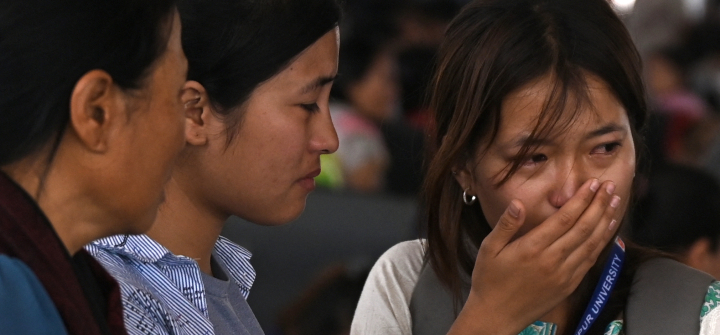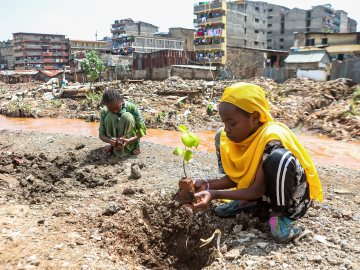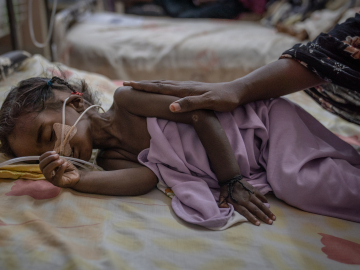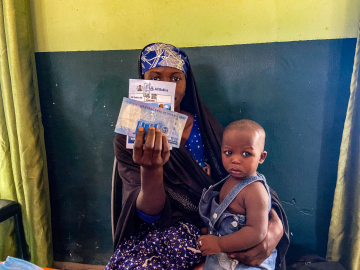PTSD: A Legacy of Manipur’s Enduring Conflict
NEW DELHI—Thirty-year-old Bonny Hatkhanhoih is finally sleeping.
Her younger sister Tete Tungnung tiptoes out of the room in their rented apartment in Munirka, a crowded neighborhood in South Delhi. She shushes everyone in the house. Bonny has hardly slept in weeks—the slightest noise could wake her up, and then it would be anyone’s guess when she’d be able to sleep again.
She has been suffering from severe bouts of depression and trauma since she was shot in the chest on the evening of May 5, 2023, when security personnel arrived in her neighborhood in Manipur’s Churachandpur district to evacuate Meiteis and violence broke out. Local Kukis said that security forces shot and killed four people.
The northeast Indian state is home to different tribal groups, including Meitei, Kuki, and Nagas, and has been facing ethnic violence among these groups for decades. The most recent outbreak of violence started after the Bharatiya Janata Party (a Hindu nationalist party and the state’s ruling party), recommended legal changes affecting land ownership among the tribes, mostly favoring the Hindu majority Meitei. This stirred up tensions among the tribal communities that escalated into violence, including in Bonny’s community.
After Bonny was shot, she was airlifted to a tertiary hospital in the nearby state of Assam and then brought to Delhi. Five months since her ordeal began, the three bone fractures, the punctured lungs, liver, and kidney, and the gynecological issues are healing, but the mental trauma has affected her the most.
“Despite good care and the best medicines for her physical injuries, she cannot function. She is still in shock, cannot sleep out of fear, and as soon as she closes her eyes, she gets nightmares,” says 28-year-old Tungnung. The formerly outgoing Bonny has become a shadow of her former self, and she’s afraid to talk to strangers. She has regular therapy sessions and takes medications for post-traumatic stress disorder (PTSD), but nothing seems to be working.
Not far from Bonny’s South Delhi neighborhood lives Chin Neih Hat, who lost her older sister on the same night Bonny was shot. Hat’s 32-year-old sister Niang Hoih Ching, a nurse at the local hospital, was returning home from work when she shot dead, allegedly by security forces, in Churchandpur.
“Since her death, no one in the family has recovered from the shock. My mother is back home in Churchandpur, waiting to receive her body from the morgue so that she can have a proper funeral. But she cannot sleep at night and is on medication,” says Hat, 29. Her mother has been waiting more than seven months so far.
Hat, a Delhi Airport nurse, was visiting home when her sister was killed. Her mother forced Hat to return to Delhi and safety. But soon after her arrival, she had a miscarriage—a pregnancy she did not know about.
“The doctor said that it was probably the stress and shock,” she says. “Since the miscarriage, and the fact that my mother is still back in the violence-prone area, I cannot sleep, and I am anxious all the time.”
The decades’ long conflict between tribal communities in Manipur has had a lasting impact on mental health. The prevalence of mental illnesses among adults in Manipur is 19.9%, nearly double the nationwide prevalence of 10.6%, according to a 2020 Psychological Studies article about the relationship between mental health and long-term conflict and violence.
Anxiety, flashbacks, and sleeping difficulty are all signs of PTSD, which if left untreated, can lead to an increase in aggression, says Jaswant Jangra, a senior resident in psychiatry at the All India Institute of Medical Sciences. “The current violence could thus also be a result of decades of internal conflict in the state,” Jangra adds.
In areas with poor mental health infrastructure, the trauma keeps getting worse, he says. “Healing is possible only if proper care and counseling are given, but there are not even enough mental health care facilities [and] professionals to help these people," he says.
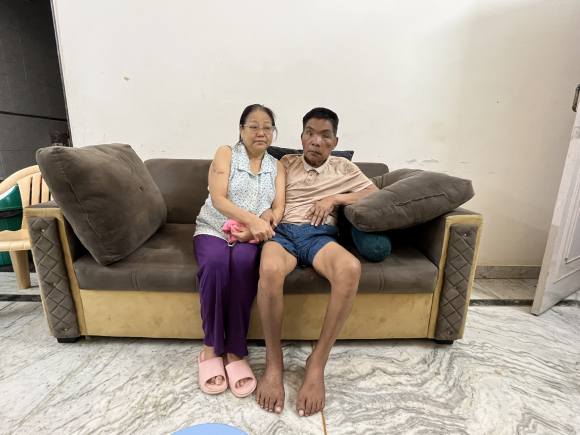
Moinu Valte sits with her husband Vungzagin Valte, a Manipur politician, who was attacked by a mob in May 2023. Cheena Kapoor
The latest violence has led to so many new trauma cases in Manipur’s capital Imphal that patients are traveling 2,400 kilometers (nearly 1,500 miles) to New Delhi for care.
In a July commentary, Nelson Loitongbam, a senior psychiatrist at the Jawaharlal Nehru Institute of Medical Sciences in Manipur, wrote that until last year his department saw one or two PTSD cases per month. But since the violence started, the number has shot up to between five and seven cases per day. Initially, the hospital saw a spike in acute stress cases (stress that's less than a month old, after which it’s considered PTSD). Those patients are now returning as PTSD cases; many are withdrawing from friends and family. Of the 30 to 50 patients being treated in the hospital’s outpatient department, at least 10% are now coming in with PTSD symptoms.
Mawinu Valte, wife of Vungzagin Valte, a ruling party member of the legislative assembly in Manipur, bitterly recalls how her husband was attacked by the mob in May in Imphal. A local politician, her husband was subjected to electric shocks from exposed wires, leaving him paralyzed.
“The trauma caused due to his condition has got me hospitalized twice, too. I think everyone is now prepared for future rounds of violence, as all the trust between the two communities is lost,” laments Valte.
Cheena Kapoor is an independent journalist and documentary photographer based in Delhi. Follow Cheena on Twitter and Instagram.
Ed. Note: The description of the May 5, 2023 events in Manipur’s Churachandpur district has been updated based on new information.
This article is part of Global Health NOW’s Local Reporting Initiative, made possible through the generous support of loyal GHN readers.
Join the 50,000+ subscribers in over 170 countries who rely on Global Health NOW summaries and exclusive articles for the latest global public health news. Sign up for our free weekday newsletter, and please share the link with friends and colleagues.
A woman cries as she waits at the Imphal airport to flee ethnic violence in the northeastern Indian state of Manipur on May 7, 2023. Arun Sankar/AFP via Getty Images

